Champions Trophy, Cricket
This is a collection of articles archived for the excellence of their content. |
Contents |
How it all began
Gaurav Gupta| Batting out of an identity crisis| May 26 2017| The Times of India (Delhi)
Since Its Inception, Champions Trophy Has Had To Assert Its Standing. But Cricket's Been Enchanting
Jagmohan Dalmiya was fondly called by many in cricket ad ministrative circles as `Dollar miya' for a good reason. In 1998, as the president of the International Cricket Council (ICC), Dalmiya devised the ICC KnockOut Trophy Wills International Cup (tobacco companies could sponsor sporting events those days). It was a global tournament much inferior in stature to a World Cup, but had enough potential to generate funds for a cash-starved cricket body .
The aim was simple: Generate funds to help develop cricket in associate nations. Dalmiya's vision was to globalise a sport played only by a handful of countries. The inaugural edition held in Bangladesh's capital Dhaka, involved the eight top cricket-playing countries of the world.
It's indeed ironic that about t It's indeed ironic that about two decades later, as the eighth edition of the tournament kicks off in England from June 1, there is no West Indies; instead you have Bangladesh, who didn't play in their `home' event because they weren't eligible, despite having qualified for the 1999 World Cup and winning the 1997 ICC Associates' Trophy .
Sachin Tendulkar, then at the prime of his career, slammed 141 and then took 4-38 to single-handedly script India's 44-run win in the `third quarterfinal' over Australia.That joy , however, was short-lived as they lost to Windies in the semis. The inaugural tournament remains the only major cricket triumph for South Africa, more famous for `choking' at big times, crucially under Hansie Cronje, before he was sensationally named as the sport's leading matchfixer two years later.
In 2000, re-christened as the ICC Champions Trophy, the format was changed from knockouts to league-play to enable top teams to stay longer. Hosted by Kenya, it saw the emergence of a young and fearless India, powered by the arrival of Yuvraj Singh. They reached the final, before being upset by a Chris Cairns-inspired New Zealand.
Sri Lanka 2002 saw Sourav Ganguly's India, riding on youth and power, gallop all the way to the final, where they had to share honours with the hosts after the final was washed off. Even as India crashed out in the league stage in 2004 in England, the pair of West Indies tail-enders Courtney Browne and Ian Bradshaw provided a thrilling finale in a memorable, unbeaten 71-run partnership for the eighth wicket against England at the Oval.
Things, however, had changed when a reluctant India hosted it in 2006. The BCCI officials' main grudge now was that all the money from the event was flowing into the ICC coffers with India gaining little or nothing from it. Worse, the hosts were knocked out before the semis, reducing further interest to a zilch.
By the time the next edition in South Africa in 2009, ODI cricket itself was struggling for existence with the advent of the faster-paced Twenty20. India again failed to reach last four, and a concerned ICC decided that the 2013 edition in England would be the last. At that point, the mandarins in the ICC seemed keen on a World Test championship in the hope to make Test cricket interesting and relevant.
But that didn't work as India struggled badly in Tests in Australia and England in 2011-2012 and there was a fear that they make not even make the cut-off for the final four teams, or even six, for the Test championship. Without India, it would be difficult to find sponsors for a format where the TV ratings and crowd attend ance were dwindling in most countries.
It was in this scenario that MS Dhoni's India, already the ODI world champions in the 2011 tournament at home, won the Champions Trophy in England in 2013.
The impact of this triumph was the sur vival of a tournament which many still feel is a niggling fixture in the calendar in this day and age where T20 cricket rules roost, a gruelling but wildly-followed 45-day IPL being a case in point.
There are still many critics of the Champions Trophy in the Indian board. India is to host the 2021 edition, but if the ICC's proposed ODI league, designed to make bilateral ODI cricket more relevant, kicks off by 2019, then the future of the Champions will become uncertain.
However, even though ODIs feel sort of `old-fashioned' in the T20 age, few things do go in favour of this tourna ment. Unlike the World Cup, it's much shorter and crisper in duration -this edition will last 18 days -and pits only the top teams against each other.
With tickets for the June 4 clash between India and Pakistan at Edgbaston being sold out within just half-hour, it tells you that this tournament may just live on.
Interestingly, conceptualised to gener ate funds for newer cricket pastures, the Champions Trophy may just end up pro ducing revenue which may be critical for the survival of some of the once-powerful but struggling cricketing centres like the West Indies and Pakistan, left in dire straits financially due to lack of international cricket at home.
Do the cricketers want to play in it?
India coach Anil Kumble's suggestion to the BCCI, at the height of the recent tussle between the board and the ICC, that the team didn't want to boycott the event, gives a fair indication of how much it matters to the players. The Champions Trophy, as India skipper Virat Kohli said on eve of the team's departure, is more competitive than the WC, and clearly, every international cricketer worth his salt would want to be tested against the best.
Champions Trophy 1998
See graphic.
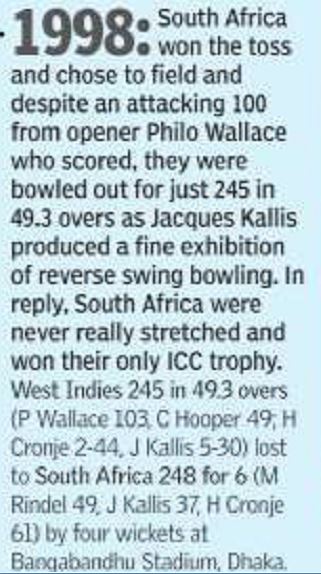
From The Times of India
Champions Trophy 2000
See graphic.

From The Times of India
Champions Trophy 2002
See graphic.
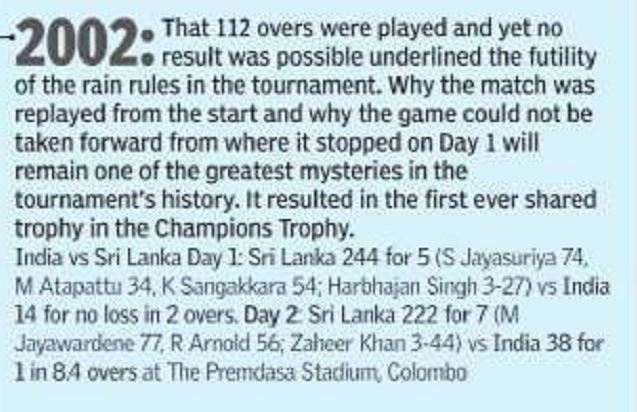
From The Times of India
Champions Trophy 2004
See graphic.
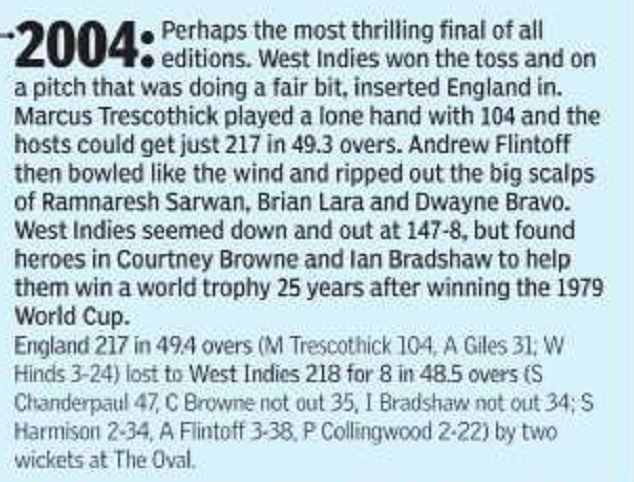
From The Times of India
Champions Trophy 2006
See graphic.
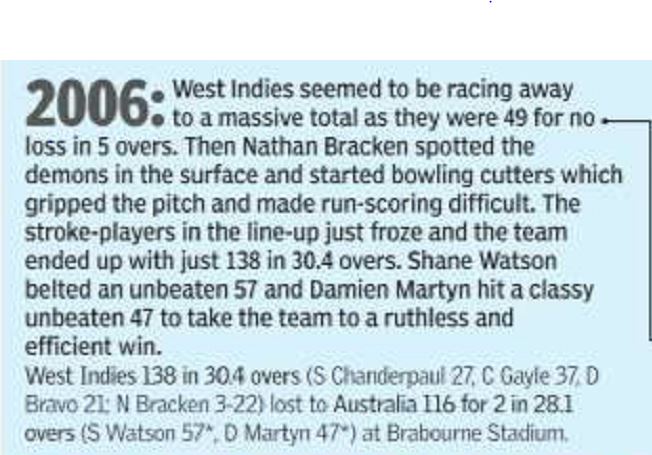
From The Times of India
Champions Trophy 2009
See graphic.
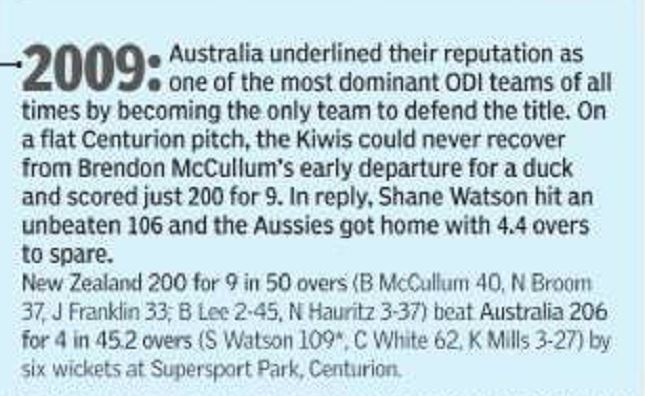
From The Times of India
Champions Trophy 2013
See graphic.
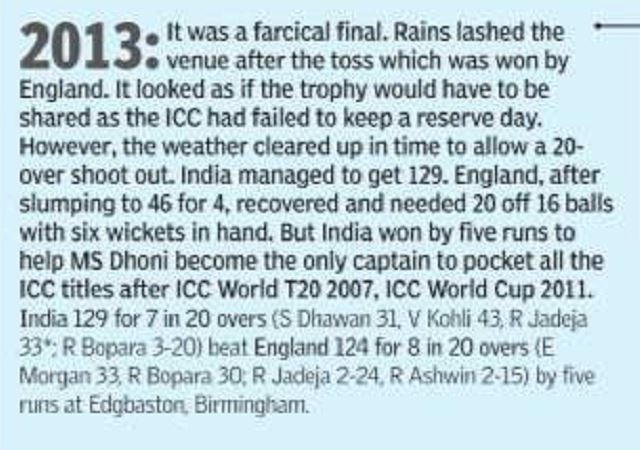
From The Times of India
History
Initially known as the ‘Mini World Cup’ put in place to raise funds for the game’s development, the 2017 ICC Champions Trophy will mark its eighth edition when England lock horns against Bangladesh in the first game at the Oval, London.
Here’s a look at the previous seven editions of the ICC Champions Trophy:
Year: 1998
Host: Bangladesh
The 50-over tournament was launched with the first two editions called the ‘ICC Knockout’. The inaugural edition was officially named the Wills International Cup.
The tournament, held from October 24 to November 1, saw South Africa winning their first and till date their only ICC event. Hansie Cronje’s side downed Sri Lanka by 92 runs (D/L) in the semi-final, and riding on Jacques Kallis’ all-round show, got the better of West Indies in the final. With 164 runs and eight wickets in three games, Kallis won the Man-of-the-Match and Man-of-the-Tournament awards.
Special Mention:
Innings of the tournament - Sachin Tendulkar’s 141 against Australia.
The way he played Michael Kasprowicz and Co was breathtaking. His innings was studded with 13 fours and three sixes.
New Zealand’s Chris Cairns celebrate after defeating India in the 2000 Champions Trophy final. (AFP)
Year: 2000
Host: Kenya
For the second consecutive time, India’s first game was against the mighty Australia, captained by Steve Waugh. A 80-ball 84 from debutant Yuvraj Singh guided India to a 20-run upset win and knocked out the world champions.
In the semi-final, new skipper Sourav Ganguly’s 141 (against South Africa) left India one step from glory while Shayne O’Connor and Roger Twose’s brilliance sealed the deal for New Zealand against Pakistan.
In the final, Chris Cairns’ unbeaten 102 with a dodgy knee upstaged Ganguly’s 117 as the Kiwis, for the only time, won an ICC event. The victory was made sweeter as they had major injury issues during the tournament. Cairns, Daniel Vettori and Dion Nash missed the semi-final but the others stepped up to the plate as they went on to be crowned champions.
Year: 2002
Host: Sri Lanka
Sri Lanka were in magnificent form in the group stage, and after crushing Australia in the semifinal, a second ICC tournament win was on the cards.
Sourav Ganguly-led India, after defeating Zimbabwe and England, pulled off a win over South Africa to reach their second ICC Champions Trophy final. Virender Sehwag’s three-wicket haul and Yuvraj Singh’s acrobatics helped India to a 10-run win after Shaun Pollock’s men were 194/1 in the 38th over chasing 262. With Sri Lanka proving a tough nut to crack, an enthralling final was on its way.
But rain played spoilsport in the final, including the reserve day after the game was started afresh, and India and Sri Lanka were declared joint winners. Sehwag finished as the leading run-getter (271) while Muttiah Muralitharan was the highest wicket-taker (10).
Year: 2004
Host: England
Twelve teams competed in 15 matches played within 15 days and the final was played between the hosts and West Indies.
Marcus Trescothick’s well-compiled 104 and Ashley Giles’ 31 propelled England to 217. In reply, the Windies lost wickets at regular intervals and were reeling at 147/8. Courtney Browne and Ian Bradshaw came to the rescue and their unbeaten 71-run partnership left Michael Vaughan’s side gutted as West Indies lifted their first Champions Trophy title with seven balls to spare.
The triumph was just what Caribbean cricket needed, something they had never expected with the kind of form they were in coming into the tournament.
Ramnaresh Sarwan and Chris Gayle (R) after West Indies won the Champions Trophy 2004 title. (Getty Images)
Year: 2006
Host: India
The Aussies won the only prize missing from their impressive trophy cabinet. After performing brilliantly in the group stage, Ricky Ponting’s men dismantled New Zealand in the semis and upstaged defending champions West Indies by eight wickets in the final. Shane Watson was the Man-of-the-Match, scoring 57 and taking two wickets.
The tournament had its fair share of controversies. Before it started, Pakistan fast bowlers Shoaib Akhtar and Mohammad Asif were banned for using performance-enhancing drugs. At the presentation ceremony after the final, the Australian team was accused of ‘misbehaving’ for pushing aside BCCI President Sharad Pawar on the victory podium. Some wanted action to be taken against the champions but the matter was put to rest after Ponting apologised to Pawar.
Year: 2009
Host: South Africa
It was another chance for ‘Nice Guys’ New Zealand to finish first but Australia, led by Shane Watson’s century, successfully defended the title after going through a lean patch in limited-overs for almost a year.
With Michael Clarke, Brad Haddin and Nathan Bracken missing, the job wasn’t as easy. But Ricky Ponting’s inspired leadership and stellar shows from Mitchell Johnson, Peter Siddle and Tim Paine enabled Australia to emerge fitting champions.
The Australia skipper ended as the highest run-getter (288 runs in five matches) while South Africa pacer Wayne Parnell took the most scalps (11).
West Indies sent a second string due to a stand-off between the players and the cricket Board.
The Indian cricket team celebrates after wining the 2013 Champions Trophy. (AFP)
Year: 2013
Host: England
Flawless performances from Mahendra Singh Dhoni-led India powered them to their second Champions Trophy title.
The conditions in England were more batsmen friendly. While Bhuvneshwar Kumar and Ravindra Jadeja made life difficult for batsmen, Shikhar Dhawan and Rohit Sharma combined well to make it five wins in five for the Men in Blue.
The biggest moment of the tournament came when Dhoni decided to give the 18th over to Ishant Sharma in the rain-curtailed, 20-over final at Birmingham. With Eoin Morgan and Ravi Bopara at the crease, it was a gamble as the lanky seamer had been expensive, but his double strike turned the game in India’s favour. Jadeja and Ravichandran Ashwin did the rest as India stole the crown in the 20-20 sprint.
2017
The June 1-18 tournament was held in England for the third time.
In what can be termed as the lowest point in their cricketing history, West Indies did not feature in the tournament as they weren’t among the top eight teams in ICC rankings on September 30, 2015 - the cut-off date for qualification. Bangladesh returned to the tournament for the first time since 2006.